Adventures of an Author in Europe: If you haven’t read the beginning of my adventures, you can start here.
After my little foray into Hyde Park, and going around and around the same roundabout a few times, I finally got to the Victoria & Albert Museum. Of course, as per usual, I was very loud when I walked in. Why? Because as security was checking my bag for explosives (Europe was on high alert after Brussels) I was looking around for the ticket counter.
Me: Where do I buy a ticket?
Security: There are no tickets.
Me: [very loudly] You mean, it’s free? I can just come in and wander around for as long as I want?
Security: Yeah. Don’t get lost.
Me: [even louder] Oh, this is going to be GREAT.
And just imagine my squeal of delight when the very first room I see is the historical fashion display.
Oh, oh, oh, it was the coolest thing I’ve ever seen—except maybe for the Three Centuries of French Fashion exhibit I saw a few days later in Paris. We’ll get to that. But first, the fashion.
I took pictures of Every. Single. Item. Far away shots. Close up shots. I looked at stitching on hems and gloves so closely I fogged the glass. I can’t possibly put every picture here or describe every item, but I have so much fodder for future historical clothing blog posts my heart goes pitter-pat just thinking about it.
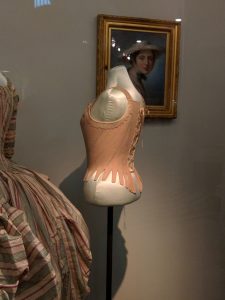
STAYS!
And when I found the extant stays, I literally shouted “Stays!” and made the people around me laugh.
What makes me so excited? Certainly I can look at historical fashion books where the details are enlarged and I don’t have to fog the glass. The V&A also has a lot of images online, which I’ve used for research purposes in the past. I’ve seen some of these items already.
But it’s not the same. It’s just not. You can’t understand sizing, texture, color from a photograph. The people of the past really were smaller than us. I kept thinking the men were the same size I was, and some of the women’s gowns seemed impossibly small. And some impossibly large!
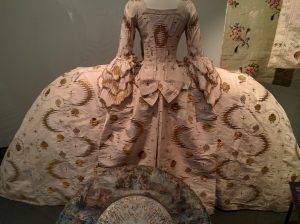
How the heck do you sit in that?
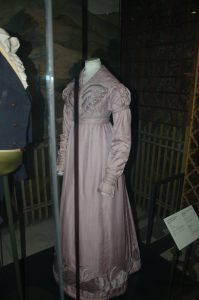
The shoes were much narrower than I expected. No way would my big ol’ wide feet get in them.
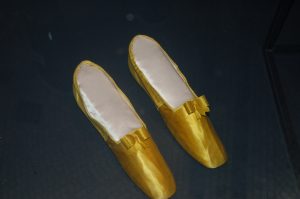
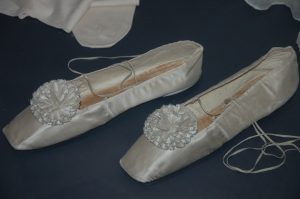
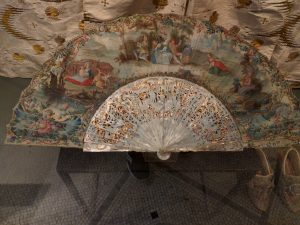
The fans were exquisite in their detail, and I could just imagine a workman standing over them with a teeny-tiny paintbrush. My eyes hurt just thinking of it.
The other reason I love fashion exhibits like this—and why I like antiques in general—is because someone wore those clothing. They woke up one morning, put on their undergarments just like we do, then their outergarments, then their accessories. They lived their life, just like we do now. Just because their clothes and society were different doesn’t mean they didn’t laugh and love and cry. More, they came before. Who we are now is because of who they were then. Every day of my life is built on the days and lives of others no longer here, but who left a legacy.
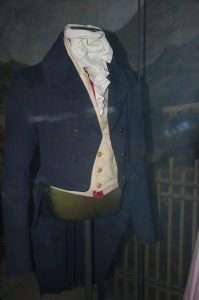
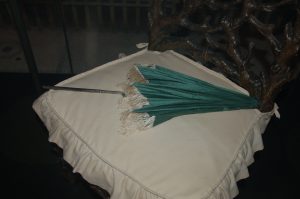 And when I see those gowns and morning jackets and horrifically narrow shoes, I think of where they wore them, and what they did in them, and how their actions shaped my life. Maybe some statesman drafted a world-altering law while wearing that jacket. Maybe the woman carrying this parasol fought for women’s equality.
And when I see those gowns and morning jackets and horrifically narrow shoes, I think of where they wore them, and what they did in them, and how their actions shaped my life. Maybe some statesman drafted a world-altering law while wearing that jacket. Maybe the woman carrying this parasol fought for women’s equality.
Or maybe they lived, married, bore children, touched the lives of others, and left a legacy in that way.
OK, so now that I have waxed poetic about historical figures, on to the marble statuary and jewelry sections!
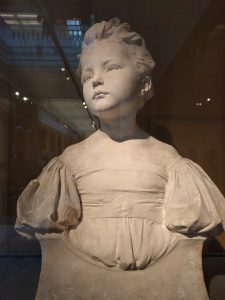 I took lots of pictures of the marble statues because I find it interesting to know what people looked like in the past (see me waxing poetic above). Put a face to the name, so to speak. And because marble is so white and pure, there is something both sad and beautiful about them, even when the faces are smiling.
I took lots of pictures of the marble statues because I find it interesting to know what people looked like in the past (see me waxing poetic above). Put a face to the name, so to speak. And because marble is so white and pure, there is something both sad and beautiful about them, even when the faces are smiling.
Now, onward and upward! On the second floor of the V&A was a really cool room full of jewelry. The room was dark, with lights only on the jewelry so they sparkled in the cases. It was almost like walking into a night club—dim, dark floors, dark walls, with the flash and blink of lights here and there. Naturally, I start to take pictures, and what do I hear?
“Ma’am, no photography. Ma’am. MA’AM!”
I was busy photographing and didn’t hear him at first.
“MA’AM, there’s no photography!”
Oops. Turns out there was a really big sign next to me that said NO PHOTOGRAPHY.
So I apologized profusely, stumbled on my words, stumbled on my feet. And the security guard/porter—we shall call him Fred to protect his identity—came over to tell me about the display I was stupidly photographing. It was the Townsend Jewel Collection, which had once contained the Hope Diamond. [Fred the Porter thought it was interesting that the Americans got the Hope Diamond and Britain got the rest]. The jewels were arranged in a swirling circle, with the hardest jewels in the middle (diamonds) fading to the softest on the outside (opals, etc.). They were also stunningly beautiful! So wish I could have posted a picture, but I think the one I took might be slightly illegal.
Fred the Porter then showed me their computer system and how I can view all of the items in the jewelry collection online. (GO HERE AND DROOL) Then he filled my head with fact upon fact upon fact about stones. He was a font of information, and I was a willing listener. A few of those facts are in my journal entry below.
The conversation then briefly drifted to history, the discovery of the Americas, and a few other subjects I’ve forgotten now. It was fascinating to get the world view of a man so enamored of stones and gems. He was my first of many interesting conversationalists on the trip! And if you ever are so lucky as to go to the V&A and find Fred (which of course you can’t, because I changed his name), ask him to tell you about the stones. The V&A couldn’t have picked a more perfect person to guard them!
Obviously, I have no pictures of the jewelry except a couple of illegal ones I took before Fred the Porter stopped me and we had our lovely conversation. But I can tell you that aside from famous jewels, there were displays going as far back as Ancient Greece. There were lover’s eye brooches, French chatelaines, 1970’s bangles, gorgeous medieval girdles, tiaras worn by princesses, death rings—oh, how I wish I could have taken pictures!
But at least I know—thanks to Fred the Porter—that I can see these all online!
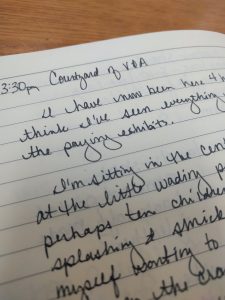
April 14, 2016 3:30 pm
Courtyard of the V&A
I have now been here 4 hours! I think I’ve seen everything now but the paying exhibits.
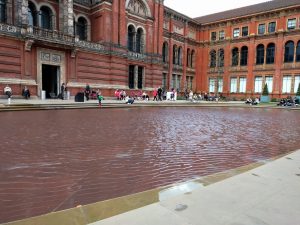
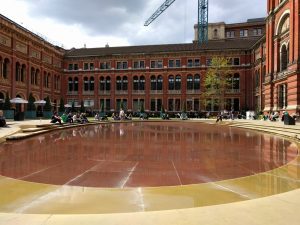 I’m sitting in the central courtyard at the little wading pool. There are perhaps ten children running and splashing and shrieking. I find myself wanting to join them, though I fancy the American would be taken up as crazy. [I took the pictures after the kids left to protect them.]
I’m sitting in the central courtyard at the little wading pool. There are perhaps ten children running and splashing and shrieking. I find myself wanting to join them, though I fancy the American would be taken up as crazy. [I took the pictures after the kids left to protect them.]
Since I left the fashion area, I’ve seen many marble statues and took pictures. Busts, statues in the classical style and a few funeral pieces that were at once a celebration of life and so very sad. The girl on the couch had the most lovely poem on the side of her statue.
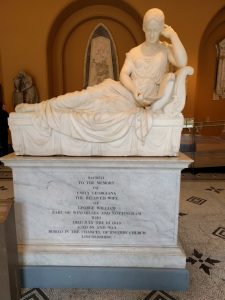
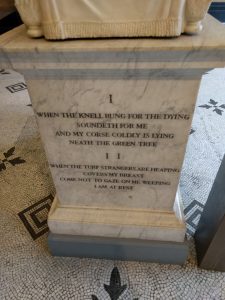
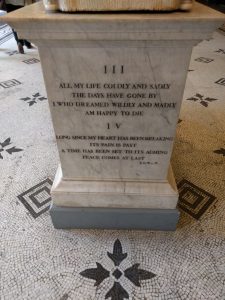
And the Finch family effigies, with father and mother, and the names of all twelve children was very interesting. It was commission when he died, but his died a decade later. What must it be like to look on your husband’s cold stone face every day?
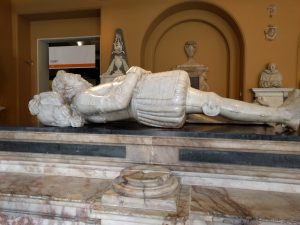
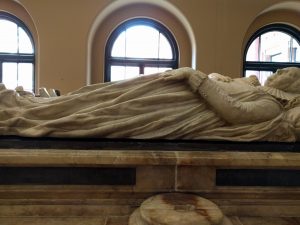
Then I found the jewelry. Oh. My. God. From Ancient Greece to 2000. I also got yelled at for taking pictures. Stupid American! But Fred and I spent a pleasant half hour discussing jewelry and history and the Americas and all sorts of things.
Notes from the jewelry collection:
The Townsend jewels; part of the Hope Collection.
The Londenderry jewels brought back from India
The green stones (chrysoprase?) that were for Charlotte’s wedding day
A rough cut green diamond – green from radiation a billion years ago
Death and love rings from the Middle ages
Girdles!
Chatelaines!
Tiaras from the 1800s
Steel that was intricate and black
Apparently much of the collection is online. Just need to find the jewelry page.
Also, Fred the Porter said that we are part of the earth, and all of the things inside stones—iron, magnesium, oxygen, radiation—they are all part of the earth as well. I would add they are all also part of the Universe, as are we.
Oh, and when tourmaline gets hot, it creates and electrical shock. They used to use them in Geiger counters!
After jewelry I looked at silver and gold stuff, mostly religious, but then I found the portrait gallery. I only spent about 15 minutes there, taking pictures of anything from my time period so that I can study hair and clothing. [That shall be a historical blog post for another day!]
Then I found the tapestries! My God, they were huge. 20 feet tall? 40 feet wide? More? They were from the 1500’s, mostly religious in nature. So intricately woven they were amazing. [Another post for another day—but these things were COOL].
Oh, and I bought a book about underwear. 🙂 All historical. 1500s to 2000 it seems. £10
Now I shall look at the architecture in the courtyard, watch the children, drink my water and figure out where to go next. The temperature is dropping and I’m starving. And tired as well. My poor feet! [Remember, I had walked Hyde Park that morning too!]
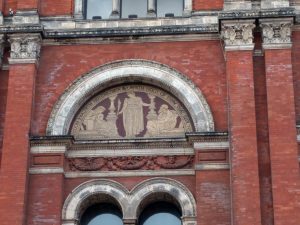
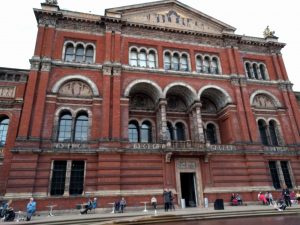
There you go then. My Afternoon at the Museum.
But it wasn’t the end of my day. I made another stop that brought me to tears. You’ll have to wait for that one, though. (How’s that for a cliffhanger?)
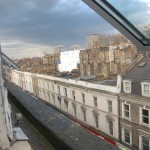




 Then I got lost again on the heath on my way back and ended up in a completely different town. It was a bit disconcerting to realize when I got back that it looked nothing like the town I had started from. This one was a bit more populated and fast paced. I had a pint at a pub, figured out where I was, and realized there was an Underground stop not far away. After more wanderings and wonderings, I made it back to London
Then I got lost again on the heath on my way back and ended up in a completely different town. It was a bit disconcerting to realize when I got back that it looked nothing like the town I had started from. This one was a bit more populated and fast paced. I had a pint at a pub, figured out where I was, and realized there was an Underground stop not far away. After more wanderings and wonderings, I made it back to London  proper. Of course, it was 219 steps down to the Underground, but I made it anyway.
proper. Of course, it was 219 steps down to the Underground, but I made it anyway. Margaret’s church, which had people buried under the floors, only the floors were so worn you could barely read the epithets. Unfortunately, no photos were allowed, but I took notes on who was buried there, the plaques on the walls and the effigies. (Fodder for future blogs again, my dears!)
Margaret’s church, which had people buried under the floors, only the floors were so worn you could barely read the epithets. Unfortunately, no photos were allowed, but I took notes on who was buried there, the plaques on the walls and the effigies. (Fodder for future blogs again, my dears!)
 After that little tour, a purchased guidebook and many pictures, I walked up (through the rain) to the National Portrait Gallery. But my rainy walk included Downing Street where I saw #10, the Banqueting Hall (built in 1800ish), the original War Office, Whitehall (all from my books! So. Cool.) Then I spent a rainy afternoon taking pictures of EVERYTHING at the gallery. Stuarts, Tudors, Regency, Victorian. I skipped everything from 1900 to the present because who cares about that?
After that little tour, a purchased guidebook and many pictures, I walked up (through the rain) to the National Portrait Gallery. But my rainy walk included Downing Street where I saw #10, the Banqueting Hall (built in 1800ish), the original War Office, Whitehall (all from my books! So. Cool.) Then I spent a rainy afternoon taking pictures of EVERYTHING at the gallery. Stuarts, Tudors, Regency, Victorian. I skipped everything from 1900 to the present because who cares about that?



 So, let’s see, I wandered into little churches that were still operating, oh, 900 years after being built. I went to Notre Dame but that was a bit of a tourist trap, so I hustled out of there fast. The working churches where people were vacuuming after services were so much more fun for me. There was one, St. Nicholas des Champs, that was between my hotel and the conference. I walked passed it a dozen times and then finally decided to pop in one day when the doors were thrown wide open. It was gorgeous. Half of it was renovated and shiny and beautiful, but the other half hadn’t been renovated yet. It had centuries of dirt on it. How could you not sit and reflect on the thousands of souls who had entered and worshipped there? Life, death, war, blood, birth, marriage—all of those happened within those stone walls. Those pictures will also be another blog post. Stay tuned!
So, let’s see, I wandered into little churches that were still operating, oh, 900 years after being built. I went to Notre Dame but that was a bit of a tourist trap, so I hustled out of there fast. The working churches where people were vacuuming after services were so much more fun for me. There was one, St. Nicholas des Champs, that was between my hotel and the conference. I walked passed it a dozen times and then finally decided to pop in one day when the doors were thrown wide open. It was gorgeous. Half of it was renovated and shiny and beautiful, but the other half hadn’t been renovated yet. It had centuries of dirt on it. How could you not sit and reflect on the thousands of souls who had entered and worshipped there? Life, death, war, blood, birth, marriage—all of those happened within those stone walls. Those pictures will also be another blog post. Stay tuned!
 As for my wanderings in Paris I loved seeing the city. It’s different than London, yet kind of the same. I thought of it as a romantically chic, whereas London was more orderly and simple. I popped into these little galleries that were tunnels through buildings with shops in them. Some of the streets near the city center are weaving, cobblestone paths through buildings with every imaginable restaurant. I also went to a fashion exhibit. Three centuries of French fashion–you can imagine how many pictures I took! And oh, just wait until I start on some of those blog posts.
As for my wanderings in Paris I loved seeing the city. It’s different than London, yet kind of the same. I thought of it as a romantically chic, whereas London was more orderly and simple. I popped into these little galleries that were tunnels through buildings with shops in them. Some of the streets near the city center are weaving, cobblestone paths through buildings with every imaginable restaurant. I also went to a fashion exhibit. Three centuries of French fashion–you can imagine how many pictures I took! And oh, just wait until I start on some of those blog posts.